Daily Vocabulary Words: Enhance Your Lexicon with Leading Newspapers & Publications
Welcome to the Daily Vocabulary section at Wordpandit!
Our mission is straightforward: to bring you essential vocabulary words featured in top newspapers and publications worldwide. By focusing on words you’ll encounter in renowned sources, we aim to help you enhance your vocabulary effectively and practically.
Our selection includes words from:
– The New York Times
– The Washington Post
– Scientific American
– BBC
– The Guardian
– Psychology Today
– Wall Street Journal
– The Economist
– The Hindu
– The Times of India
– The Economic Times
– Hindustan Times
– Live Mint
– The Indian Express
– And many more.
We are committed to your vocabulary development. Simply visit this section regularly and explore the daily posts. This is your go-to repository for commonly used words, providing significant practical benefits by familiarizing you with vocabulary from the leading publications listed above.
Make it a habit to visit our website daily and expand your lexicon with words from top newspapers and publications. (edited)
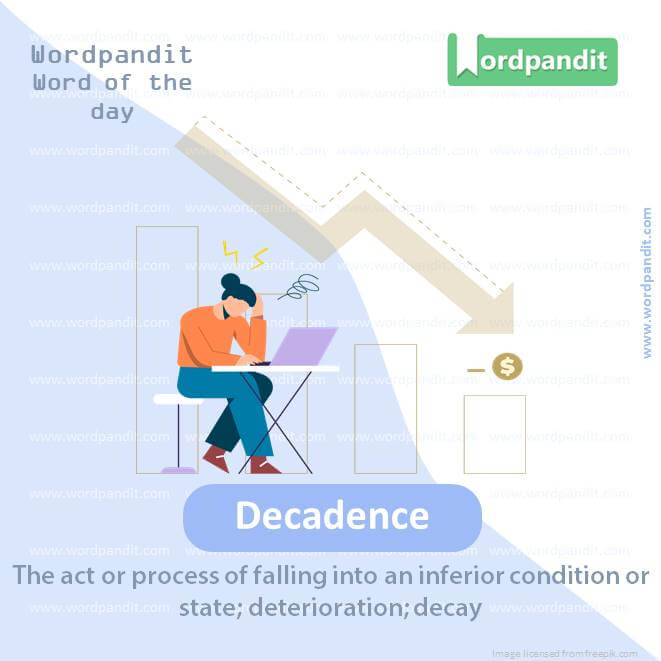
WORD-1: DECADENCE
CONTEXT: It speaks to the ways that the developed world today feels stuck in a loop of decadence and disappointment and sterile repetition, from which (some) people look upward and outward in search of hope.
SOURCE: New York Times
EXPLANATORY PARAGRAPH: Imagine having so many candies and eating them all the time, even when you know it’s not good for you. Decadence means having too much of something nice, which can make you lazy and unhealthy.
MEANING: The act or process of falling into an inferior condition or state; deterioration; decay
PRONUNCIATION: DEH-kuh-dens
SYNONYMS: self-indulgence, luxury, excess, gluttony, indulgence, extravagance
USAGE EXAMPLES:
1. The decadence of the royal court was legendary.
2. The city’s decadence was evident in its lavish parties.
3. Some see the modern lifestyle as a form of decadence.
4. The book described the decadence of ancient Rome.
WORD-2: SPANNING
CONTEXT: The novel, somewhat more clearly than its adaptation, presents a galaxy-spanning society that has wrestled with each of these possibilities and made very concrete choices, such that its civilization is defined by how it embraces, rejects or adapts to each of the forms of dynamism I’ve just listed.
SOURCE: New York Times
EXPLANATORY PARAGRAPH: Imagine a big bridge that goes from one side of a river to the other. Spanning means stretching across or covering a certain distance or time period.
MEANING: Stretching across or covering a certain distance or time period (verb).
PRONUNCIATION: SPAN-ing
SYNONYMS: crossing, extending, covering, bridging, reaching, stretching
USAGE EXAMPLES:
1. The bridge is spanning the wide river.
2. Her career is spanning over three decades.
3. The movie’s storyline is spanning several generations.
4. The tree’s branches are spanning the entire yard.
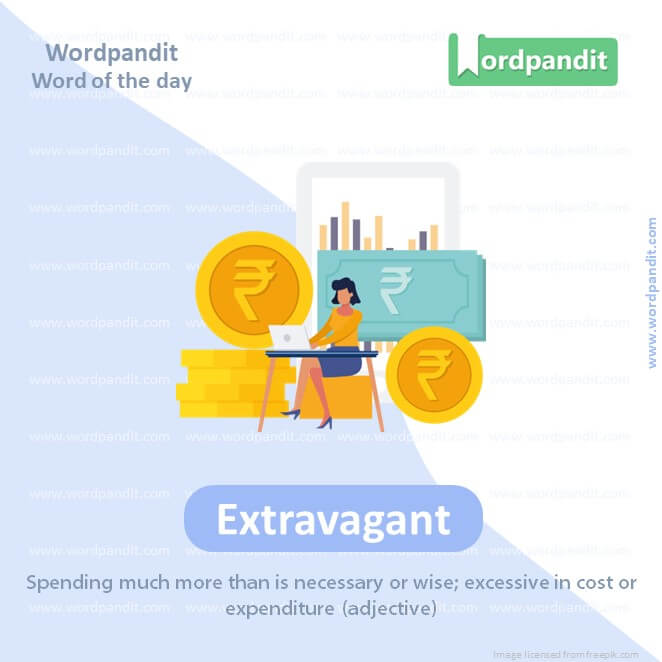
WORD-3: Extravagant
CONTEXT: They dress up for “thirst trap” parties, compliment each other’s boobs and delight in objectifying Minogue – who plays up to it with a succession of extravagant outfits.
SOURCE: Guardian
EXPLANATORY PARAGRAPH: Imagine you go to a store and see a toy that’s really, really big and sparkles more than any other toy. It’s so special that it costs a lot of money—much more than usual toys. When something is like that toy, big, special, and costing a lot of money, we call it “extravagant.” It’s like when you use a lot of crayons to color just one picture!
MEANING: Spending much more than is necessary or wise; excessive in cost or expenditure (adjective).
PRONUNCIATION: ex-TRAV-uh-gant
SYNONYMS: lavish, excessive, over-the-top, opulent, costly, luxurious
USAGE EXAMPLES:
1. She wore an extravagant dress to the party that sparkled under the lights.
2. The extravagant wedding had fireworks and a huge cake.
3. Buying a big, extravagant toy might not leave you with enough money for other things.
4. His extravagant lifestyle included trips to exotic places and dining at the finest restaurants.
WORD-4: HEDGED
CONTEXT: The Imperium’s powerful Bene Gesserit sisterhood has pursued a vast eugenic project, but one that’s hedged about with various taboos.
SOURCE: New York Times
EXPLANATORY PARAGRAPH: Imagine if you don’t want to say “yes” or “no” directly, so you say “maybe” instead. Hedged means not giving a clear answer or protecting yourself from a decision.
MEANING: Avoiding a clear answer or protecting oneself from risk (verb).
PRONUNCIATION: HEJD
SYNONYMS: evaded, dodged, avoided, qualified, fenced, limited
USAGE EXAMPLES:
1. She hedged her bets by investing in various stocks.
2. He hedged his response to avoid committing.
3. The company hedged against market fluctuations.
4. They hedged their decision until more information was available.
WORD-5: RECOILS
CONTEXT: She recoils from the idea, since “no word or deed could imply that men might be bred on the level of animals.
SOURCE: New York Times
EXPLANATORY PARAGRAPH: Imagine touching something very hot and quickly pulling your hand back. Recoils means to suddenly move back or away from something scary or unpleasant.
MEANING: To suddenly move back or away from something scary or unpleasant (verb).
PRONUNCIATION: ree-KOYLS
SYNONYMS: retreats, flinches, draws back, shrinks, pulls back, withdraws
USAGE EXAMPLES:
1. She recoils in fear when she sees a spider.
2. The soldier recoils from the loud explosion.
3. He recoils at the thought of eating broccoli.
4. The cat recoils from the spray of water.
WORD-6: FLOURISHED
CONTEXT: Religion has flourished in this spacefaring future via a kind of syncretistic creativity.
SOURCE: New York Times
EXPLANATORY PARAGRAPH: Imagine a plant that grows big and strong with lots of flowers. Flourished means to grow and do very well.
MEANING: To grow or develop in a healthy and vigorous way (verb).
PRONUNCIATION: FLUR-isht
SYNONYMS: thrived, prospered, bloomed, succeeded, blossomed, grew
USAGE EXAMPLES:
1. The garden flourished under her care.
2. His business flourished in the new market.
3. The arts flourished during that period.
4. The child flourished in the supportive environment.
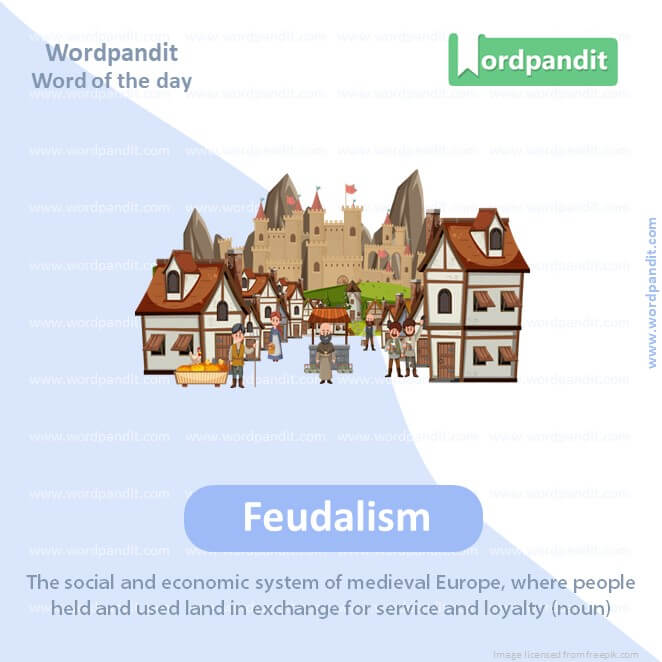
WORD-7: FEUDALISM
CONTEXT: A stable but cruel order based on corporate feudalism, religious manipulation, and other interlocking exploitations.
SOURCE: New York Times
EXPLANATORY PARAGRAPH: Imagine a time when kings and queens owned all the land, and people had to work for them in exchange for protection. Feudalism is a system where landowners have all the power, and others work for them.
MEANING: The social and economic system of medieval Europe, where people held and used land in exchange for service and loyalty (noun)
PRONUNCIATION: FYOO-duh-liz-um
SYNONYMS: manorialism, serfdom, vassalage, lordship, feudal system, medieval system
USAGE EXAMPLES:
1. Feudalism was common in medieval Europe.
2. The lord had many serfs working under feudalism.
3. Feudalism structured society in a hierarchical way.
4. The decline of feudalism led to more modern social systems.
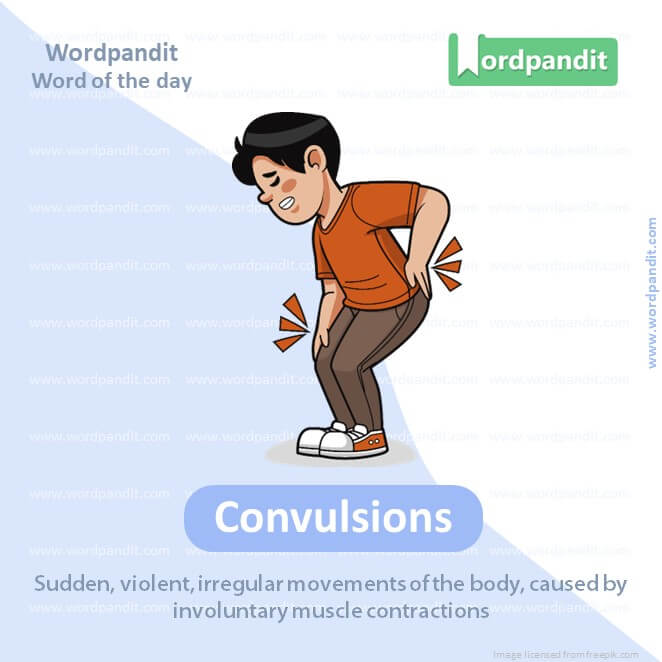
WORD-8: CONVULSIONS
CONTEXT: The only path out of a corrupt status quo involves convulsion and fanaticism and death.
SOURCE: New York Times
EXPLANATORY PARAGRAPH: Imagine if your body suddenly started shaking all over without you being able to stop it. A convulsion is when your muscles contract and move uncontrollably.
MEANING: Sudden, violent, irregular movements ofthe body, caused by involuntary muscle contractions
PRONUNCIATION: kun-VUL-shun
SYNONYMS: seizure, spasm, tremor, fit, shake, twitch
USAGE EXAMPLES:
1. The patient suffered a convulsion and needed immediate help.
2. The earthquake caused a convulsion in the ground.
3. His sudden convulsion scared everyone in the room.
4. Convulsions can be a sign of a serious medical condition.
WORD-9: PROPHECY
CONTEXT: A new explosion of interstellar migration, and also to breed
a line of human beings immune from prophecy and prescience.
SOURCE: New York Times
EXPLANATORY PARAGRAPH: Imagine someone telling you what will happen in the future like in a fairy tale. Prophecy means a prediction about what will happen in the future.
MEANING: A prediction about what will happen in the future (noun).
PRONUNCIATION: PRAH-fuh-see
SYNONYMS: prediction, forecast, foresight, divination, augury, prognostication
USAGE EXAMPLES:
1. The prophecy foretold the return of the king.
2. She made a prophecy about the end of the world.
3. The ancient prophecy spoke of great change.
4. His prophecy came true years later.
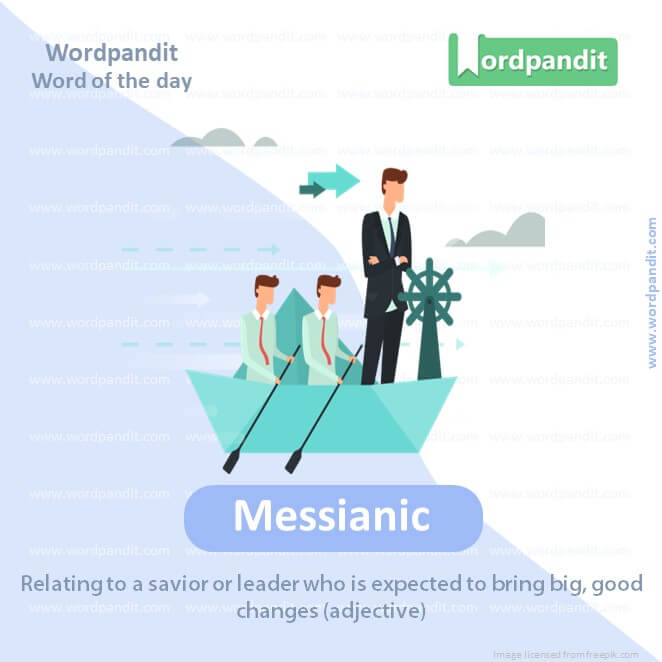
WORD-10: MESSIANIC
CONTEXT: This period of fanaticism and dictatorship and messianic rule was necessary to liberate humanity from still worse, potentially species-ending forms of dictatorship and messianic control.
SOURCE: New York Times
EXPLANATORY PARAGRAPH: Imagine a superhero who is believed to save the world. Messianic means relating to a savior or someone who is expected to bring great change or salvation.
MEANING: Relating to a savior or leader who is expected to bring big, good changes (adjective)
PRONUNCIATION: mes-ee-AN-ik
SYNONYMS: savior-like, prophetic, redemptive, deliverer, Christ-like, reformist
USAGE EXAMPLES:
1. He had a messianic vision of a better future.
2. The leader’s followers viewed him in a messianic light.
3. Her messianic zeal inspired many to join the cause.
4. The messianic prophecy promised a time of peace.
Vocabulary Definition
Understanding a language requires a deep grasp of the ‘vocabulary definition’. These precise meanings of words shape our understanding and communication. However, to successfully learn ‘vocabulary definition’, one must do more than just memorize a dictionary. So what’s the perfect approach to assimilating ‘vocabulary definition’?
The compelling answer is context. To truly comprehend ‘vocabulary definition’, expose yourself to diverse reading materials such as books, magazines, newspapers, and digital content. This approach equips you with a practical understanding of ‘vocabulary definition’ and illuminates the nuanced ways in which they get employed in conversation and writing.
An innovative way to enhance memory while learning ‘vocabulary definition’ involves visualization. By creating a mental image representing the definition, your brain can help cement the association between the word and its meaning, improving recall capability significantly.
Now, understanding and retaining ‘vocabulary definition’ is only one part of the equation. The other, equally essential part is application. Actively using these words in your personal conversations, professional communication, or social media posts will reinforce your understanding and usage of ‘vocabulary definition’.
Interactive language tools can be a great help when mastering ‘vocabulary definition’. Language-learning software and applications often provide comprehensive word definitions, examples, and even quizzes to test your learning progress.
In conclusion, the journey of embracing ‘vocabulary definition’ demands a blended approach. Diversified reading materials, visualization techniques, active application, and the leverage of modern language-learning tools together chart a pathway to mastering ‘vocabulary definition’. Remember, every word definition you conquer is a stepping stone leading you to the magnificent mansion of language proficiency. Happy learning!











